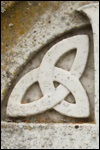You may have gone forward at a Billy Graham rally and accepted Christ. You may have responded to an invitation at the end of a morning service. You may have prayed with a Sunday school teacher or parent years ago. You may have listened to a TV evangelist's appeal or read a tract such as the "Four Spiritual Laws" and prayed the sinner's prayer. You may have made a decision at a summer camp, or Jesus may have met you in a desperate hour as you cried out to him. But what exactly happened at that moment? You were delivered from Satan's kingdom and catapulted into the kingdom of God.
At the time this occurred, you probably had no idea that this was what was actually happening. It might even sound foreign to you now. Often, the gospel is presented simply as asking Jesus into our hearts, having our sins forgiven and receiving the assurance that were we to die tonight, we would "go to heaven." The Christian life is then spelled out as reading our Bible, learning to pray, finding a church where Christ is preached and sharing our faith with others. But conversion includes much more than this. The apostle Paul wrote to the Colossians that they had been transferred from the kingdom of darkness into the kingdom of God's Beloved Son (see Col. 1:13).
When Jesus began his public ministry, he announced that the kingdom of God was within reach and called his listeners to repent and believe in the good news (see Mark 1:15). Later, he said that the kingdom of God was in their midst (see Luke 11:20). He was the King and had come to bring God's reign into their history and into their hearts. He does the same today. When we submit to him, he enters in by his Spirit. Our conversion immediately depletes the population of Satan's kingdom by one as our little stories become a part of Jesus' big story, and we now participate in his purpose to re-establish God's reign throughout the universe.
Two problems must be solved for us to become Christians. First, we must be delivered from Satan's kingdom. Second, we must be delivered from God's wrath. But for many people today, these two problems are almost incomprehensible. Let me sketch it out.
Deliverance from Satan's Kingdom
The whole world system is under the rule of a powerful, supernatural being that hates God, hates all goodness, hates all absolutes (apart from his absolute evil) and hates you and me (see 1 John 5:19). He is God's unequivocal enemy. Once a great heavenly angel, Satan rebelled against God's kingdom in order to establish his own. He now hides behind our perceptions of reality (worldviews), assumptions, values and the political and religious systems of this fallen world order. He lies to us about our value and worth, the meaning and purpose of life, and our ultimate destiny. Often, he uses the arts and the media to warp our sense of reality and to turn us away from God. He thrusts other, false gods (idols) before us and seduces us into worshiping them, even to the point of addiction. He disguises himself as an "angel of light" (2 Cor. 11:14). He manipulates our instincts—to eat, to not be eaten and to reproduce1—and our insecurities in order to market his false ideology and the promises and products of his kingdom.
The deepest emptiness in our lives—the hole in our souls—is the absence of God. Satan promises that we can fill that hole with substances, activities, products, ideologies and people. Yet the truth is that we are made for God, and without his life in us, we will remain spiritually dead and eternally lonely. In all creation, those beings closest to God are people. We have been created to love God and to love each other as ourselves. But apart from God, people become idols, too. We become codependent and addicted to each other, which ultimately perverts every relationship. In turn, our twisted relationships become an inroad for demonic assault, which ends up in death. Satan deceives us in order to kill us. He wants us to share in his doom, because he hates us and the God who loves us and made us in his image.
Over the entry gate to the Nazi concentration camp Auschwitz, a sign in wrought iron letters reads, "Arbeit Macht Frei," which translates, "Work Makes You Free." Millions of Jews and others saw this promise as they entered the camp, only to find it was a total lie. There was no freedom there, only death in the gas chambers. Likewise, Satan lifts up his signs over the gates of our prison as we roll into his gas chambers: "You can be your own god" or "Go ahead and have some fun now—you can worry about God later" or "Put yourself first! Who else is going to look after your interests?" The devil continually pounds on us to grab more, consume more and collect more. He promises to satisfy us with quick and bogus fixes that will feed our egos, our insecurities and the ache inside. But when those fixes wear off, there is always the morning after. As we go through withdrawals, loss and grief, we sink into depression, anger turned inward, and "buyer's remorse"—the pain of realizing that the new hookup, pickup, job advancement or whatever never satisfies for long.
Again and again, Satan lifts up signs along the road to his gas chamber—signs that promise us freedom from the cycle of pain and shame. But there is only one true banner: "Christ Is Freedom" (see John 8:31-32). The devil wants to block this truth from our minds so that we remain docile, drugged, obedient, fantasy-fed, fantasy-led and addicted subjects of his doomed kingdom.
Deliverance from God's Wrath
If it is hard for some of us to believe in Satan's kingdom; it is even harder to believe in God's kingdom, a kingdom of justice ruled by a just King. God is just. He judges our moral failure—which he calls "sin"—and will separate himself and his people from unrepentant sinners for eternity. One day, he will clean house and totally rule his universe again. Why does this seem to be so far off our radar screens?
First of all, in our postmodern world, few people believe in moral absolutes anymore. We are told that these absolutes make us narrow, judgmental and intolerant of others, their religious convictions and their lifestyles. Our inherited philosophy is to live and let live. We are told that each person has his or her own truth and that the ultimate goal for everyone ought to be open-mindedness.
While many in our culture champion moral relativism, none of us can actually live that way. Very few people could tolerate living in a society without rules. Without absolutes, there would be no Constitution or Bill of Rights, no laws, no justice, no police, no contracts, no partnerships, no corporations, no marriages. We would live the law of the jungle.
Without absolutes, we could lie, steal and murder without consequences. We could be racists, fascists or anarchists. Our courts would collapse due to the lack of any absolute standard of justice, and we would collapse along with them—our identities fragmented and our mental health shattered. Without absolutes, we would be ravaged by addictions, trying to fill the holes in our souls, with our passions controlling us rather than us controlling them.
Without absolutes, we would have no personal boundaries or moral structure for life. We would have no way to tell our children what is right or wrong. Did you beat up your sister? That's your "truth." Did you have sex with your brother, your child, your dog? That's your "truth." The absence of absolutes leads logically to insanity and suicide. It is undisguised insanity.
Without an absolute standard of justice, democracy would be impossible. Truth, accountability and public trust would all go down the drain. There would be no basis for moral outrage over Third World debt, poverty or the AIDS pandemic. Growing opium in Afghanistan or cocaine in Columbia? No problem! That's your "truth." Building reactors for nuclear bombs? No problem. That's an internal matter, not a matter for the United Nations or the community of nations. Polluting the atmosphere? Increasing global warming? No big deal. No absolutes means no commitment to the next generation or to the preservation of the earth.
C. S. Lewis argued in Mere Christianity that our innate sense of right and wrong is reflected by our offense at someone breaking into line at the drinking fountain or our refusal to give a medal to a soldier for running away from battle. God's moral law is written on our hearts, despite how relative our cultural morals have become. God is completely just, and not only do his laws reveal his just character, but also living by them makes life possible in a sick and fallen world.
The second reason why we are asleep to the reality of God's justice and judgment is because we've been told that if God exists, he is merely a benign spirit who would never judge anyone or send him or her to hell. He is the Great Therapist, committed to rebuilding our low self-esteem. But however this reassuring image may be, the life and death question is not, "Is our concept of God pleasant, agreeable or comforting?" but, "Is it true?"
It has often been said that we expect more justice from the sheriff than we do from God. We are offended when criminals go free because we believe that crimes must be punished and justice must be served. When the police officers accused of assaulting Rodney King were acquitted by a mostly white jury in 1992, many people felt justice had not been done, especially since the brutal beating of King was captured on videotape for the world to see. Likewise, many people found it hard to believe that O. J. Simpson walked on a double-murder charge. It is hard to forget the TV images of him fleeing the law in the back of a Ford Bronco with his passport, thousands of dollars in cash, and a false beard.
If we demand human justice in this life, how much more should we demand divine justice? Will history's mass murderers escape God's justice? The answer is no. Even if they commit suicide like Hitler in his bunker or die of old age like Stalin, they must face the bar of God. There is a Day of Judgment coming in which divine justice and the human cry for justice will meet and be satisfied.
While most of us are not murderous tyrants like Hitler, Stalin, Pol Pot or Osama bin Laden, we are all sinners. Despite all our rationalizations and excuses, we too deserve God's judgment, his divine wrath. Not only have we failed to measure up to his absolute standard—in intention if not in action (see Matt. 5)—we have failed to measure up to our own standard. Every time we lie, gossip, withhold the truth, shade the facts or tell people what they want to hear rather than what we know or believe to be the truth, we violate our own conscience. We violate the law of God written on our hearts.
Therefore, because God is perfect in his moral character and righteous in his judgments, we stand condemned both before him and our own consciences. We deserve his wrath for our sin—our fundamental failure to worship, honor and serve him as God. We have substituted ourselves for him, making our needs, wants, lusts, philosophies, fantasies and drives the worship center of our lives. We either worship God or we worship idols, and the most available and pervasive idol is ourself. Our basic question is, "What's in it for me?" instead of, "What's in it for God and others?"
If we need deliverance from Satan's kingdom, then we also need deliverance from God's wrath. His holy anger is the consequence of his justice, which stands against our sin and finds us guilty of rebellion, selfishness and idolatry. We desperately need deliverance, because life is short and we will soon appear before God's judgment seat on the other side of death.
Deliverance into God's Kingdom
Now we are ready for the most outrageous and surprising good news of all: The kingdom of God is within reach! God is establishing his justice and sovereign rule in this world to uphold his law and forgive, receive and transform sinners. His kingdom comes, however, not as a result of a divine ego trip, but rather through humble sacrifice and self-giving love. It turns our values upside down.
For the kingdom of God to fully come, Jesus had to become the suffering servant of the Lord. According to Isaiah 53, he took the place of sinners, satisfied divine justice, and died the death we all deserved for our sins. As the Lamb of God who takes away the sins of the world, Jesus went freely and resolutely to Jerusalem to sacrifice Himself on the cross. Because he was both human and divine, as a human he died a real and bloody death, while as a divine being he paid an immeasurable price for the garbage pile of sin dumped by the human race.
In the death of Jesus, God's justice was satisfied (upheld), the moral and legal debt of all our sin was paid in full, and God's mercy was extended to each of us. He didn't quit being a God of wrath and suddenly become a God of love; he has loved us continually from all eternity. But the ground on which he could accept us was dramatically changed. The penalty for sin was paid, and all who have faith in Jesus are freely and fully justified (see Rom. 3:26). At the cross, God lifted his wrath from us and placed it upon himself through his Son. The death we deserve to die, he died for us in our place. All we can do in response is to lay down our arms, humble ourselves and receive his acceptance by faith alone.
Martin Luther said that to become a Christian is like being married. When we are wedded to Christ by faith, we give him all we have and he gives us all he has. We give him all our sins, and he gives us all his righteousness. We are now righteous before God through the righteousness of his Son.
When we ask Jesus to forgive us, we enter God's kingdom through the gate marked "Justice Satisfied, Mercy Granted." God's reign is set up in our hearts. But there is more! When we come to Christ, we are not only delivered from Satan's kingdom but are also delivered into God's kingdom. When we come to Christ, he zips us open and jumps inside. We are raised to a new life.
—Adapted from Start Here: Kingdom Essentials for Christians by Don William. Published 2006 by Regal books, www.regalbooks.com. Used by permission. All rights reserved.










